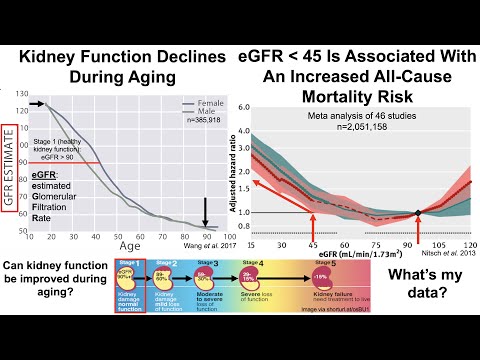Has anyone noticed a significant drop in their eGFR levels while taking rapamycin?
Mine has dropped significantly with a strong correlation to my rapamycin intake.
In medicine there’s always a U curve and a sweet spot, and these can differ among individuals. At 6 mg / week over 5 years my GFR is essentially the same as 15 years ago and I’m 67.
Find your sweet spot and don’t exceed it.
BTW, it’s curious that people who drink alot of water tend to have Lower gfr’s. Go figure.
What is eGFR a marker of? I’m not familiar with that test.
Quest lab def: “Estimated Glomerular Filtration Rate (eGFR) is a test for kidney damage. eGFR is calculated using your serum creatinine result, age and gender. Creatinine is not sensitive to early renal damage since it varies with age, gender and ethnic background. If you are African American, your eGFR is estimated differently. Since race is not reported in this screening, you will need to use the reported result that is associated with your race. To get a African American specific result, you can multiply this result by 1.21 to get your true eGFR. The same reference ranges will apply.”
Do you by chance take creatine? I’ve noticed that when I’m on creatine, my creatinine goes up which then makes my eGFR go down, which reverses after I’ve been off creatine for at least a month. One time I took 10g of creatine in a smoothie before I had an MRI w/contrast (oops). My creatinine was so high they refused to give me the contrast and told me I was in renal failure (even though there is published data showing creatine acutely raises creatinine, which only makes sense since it’s a breakdown product). Cystatin C (alternative parameter to assess renal function) showed my kidneys were just fine.
Yes, I have been taking 5gms daily for years. It’s one of the changes I will be making before my next test.
Also highly recommend a cystatin C test. It’s easy for your provider to order and add on whatever standard blood tests you’re getting.
Thanks, I may do that.
My eGFR was 100 in early March 2022. I am 70 years old. This is slightly better than when I started taking Rapamycin in May 2020. Most of the time I was taking Rapa weekly - first 6mg later 10mg and the last few months 20mg every two weeks.(went back to 10mg per week this week).
dlhanson, curious to know your rationale for going back to weekly dosing.
There is no scientific data for using Rapamycin long term for human aging so I have chosen dose and safety by reading anecdotal evidence. The sources that I have used is Dr. Blagosklonny’s personal dose (20mg/every other week for awhile), Dr. Alan Green (his own dose and the doses he prescribes for patients either as reported by Dr. Green or a few of his patients), other doctors who personally take rapamycin, etc.
I started at 20mg/2 weeks because Dr. Blagosklonny is using that dose. Dr. Green also used that dose, at least for awhile. Dr. Green alternated 20mg Rapamycin and a senolytic treatment every other week so I used D+Q+F every other week.
I just decided I wasn’t comfortable using 20mg biweekly (and using D+Q+F biweekly also). I have no idea if this is a good decision.
Thanks, certainly a lot to digest. (LOL)
I have also been assessing the effects supplements that I take may be having on my blood panel results.
So, I have come to the conclusion that in addition to fasting I will be forgoing my supplements for a week before my next blood tests.
It might take a month for the creatine supplement to effectively wash out of your muscles (if it’s elevating your creatinine and artificially lowering eGFR). I really hope your provider will add the Cystatin C to your lab panel.
My eGFR levels haven’t changed much on Rapamycin… they are always close to 100 (just under), which is about 20 years better than I should expect according to Mike Lustgarten’s video below.
Some good resources on this:
I did come across this post in the Age Reversal Forum on this issue:
Did some research and found a study where 11 people with pre-existing kidney disease (GN) were given Rapa 5 mg DAILY. Over half became renal toxic with dropping GFR. They were given transplant dose to try to achieve level of 15ng/dl. Stopped rapa and the gfr came back to baseline after several months
The study postulated that in case where pre-existing Kidney GN that Rapa exascerbates the problem by shutting off Mtor1 which is needed by the kidney to regenerate the kidney filtering tubes. Interesting thing was the same dose helps transplanted kidney.
my eGFR changed tremendously. Was low out of range for 5 years now it has gone from the 40’s to the 80’s
I don’t know. What I do know is that this time I stopped taking creatine for one week before the test and my creatine level decreased.
Also, my eGFR has not been tested many times, but my eFGR has increased from 67 to 75.
From what I have read creatine supplementation might decrease eFGR readings.
Eating lots of meat and exercising a lot also raise creatinine. So it’s best not to do either the day before the blood test. Yes, cystatin C is a better test for kidney function.
The National Kidney Foundation has a more comprehensive eGFR calculator on their website for professionals. There are fields to factor in height and weight.
It also provides options for eGFR based on Cystatin C or a combined calculation based on creatinine plus cystatin c levels.
There is also a section to input your uACR. This is albumin/creatinine ratio urine test.
